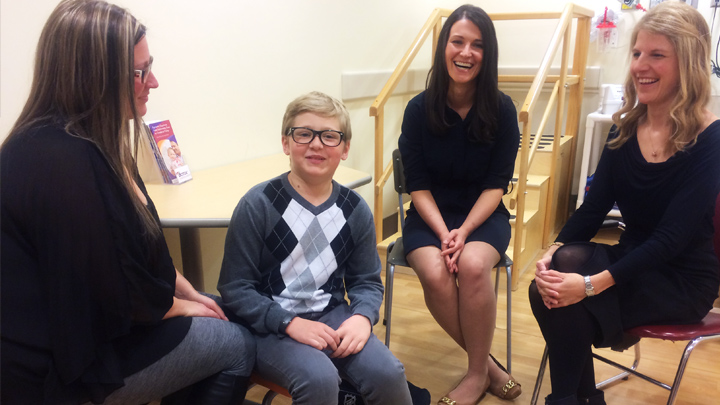
March 21, 2016

Traci Rhyason, left, and her nine-year-old son Leland hope new research will help him sleep better at night. Here they chat with researchers Lianne Tomfohr-Madsen and Fiona Schulte, at right, who are studying why kids who beat cancer have such a hard time getting a good night’s sleep.
Story and photo by Greg Harris
CALGARY — It seems cruelly unfair that kids who beat cancer are then sometimes challenged by an everyday function that most people take for granted: the ability to fall and stay asleep.
Such is the case for Traci Rhyason’s nine-year-old son Leland, who completed his last chemotherapy treatment for leukemia in 2014.
“He often wakes up three or four times a night and is exhausted when he gets up to go to school in the morning,” says Traci. “He’s almost learned to live on no sleep. It’s one of those things you don’t appreciate until it’s gone.”
Now, researchers with Alberta Health Services (AHS) and the University of Calgary are trying to better understand the scope of the problem so they can develop therapies to help cancer survivors and their families sleep better and get their rest.
“Sleeping well is critical for children’s cognitive, physical and social development,” says Dr. Lianne Tomfohr-Madsen, PhD, assistant professor with the University of Calgary’s Department of Psychology and a member of the Alberta Children’s Hospital Research Institute (ACHRI).
“Many people will occasionally experience difficulties falling asleep but, when it happens regularly, it can seriously impact health and quality of life,” adds Tomfohr-Madsen, who holds the Alberta Children’s Hospital Foundation Professorship in Child Psychology.
While in hospital, kids with cancer can develop difficulties with sleeping that stay with them when they return home — and sometimes linger long into adulthood.
There are a number of reasons children’s sleep patterns are often disrupted while they’re in hospital.
Dr. Fiona Schulte, PhD, co-investigator and an AHS psychologist and ACHRI member, says stress is a significant barrier to sleep — both in and out of hospital.
“Parents and children often have fears about monitoring the child’s condition when they return home,” Dr. Schulte says. “That anxiety turns bedtime into a challenge and may lead to a cycle of waking up in the middle of the night. The rhythms of the whole family can be disrupted.”
Researchers are looking for children between the ages of 8-18 who have had leukemia, as well as healthy children for a comparison group. They hope to enrol 100 families, 50 for each group.
Participants are asked to fill out a series of questionnaires, keep a sleep diary, and at night wear a wristwatch-like device that measures sleep quality. Sleep activity is monitored over seven days.
Researchers hope that by comparing the two groups they’ll better understand the onset, frequency and duration of sleep disruption in cancer survivors and their families.
“The data will hopefully provide some insights on possible patterns or triggers for sleep difficulties, and help us tailor better therapeutic approaches to promote healthy sleep,” says Dr. Tomfohr-Madsen.
For more information, please see familysleepstudy.com or phone 403-220-5086.